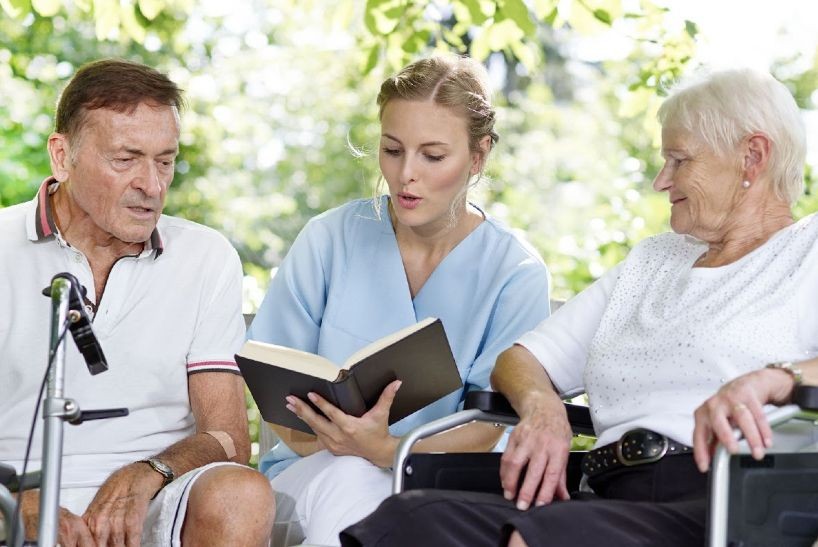Everything about APNs in Spitex and outpatient care
Specialist topics
Everything about APNs in Spitex and outpatient care
Everything you need to know about APNs in Spitex and outpatient careaSwitzerland is facing a problem that is actually based on something positive: The population is getting older and older. Thanks to ever-improving medical care, the Swiss are living longer and longer. However, they are also developing multimorbidity and more complex clinical pictures, which poses a challenge for the healthcare system. APNs in Spitex and APNs in outpatient care are intended to provide a remedy.

APN stands for "Advanced Practice Nurse". It is an academic further education qualification that members of the nursing professions can acquire. They leave the course as qualified nursing professionals and can then call themselves Master of Science in Nursing Science.
The specialists have expert knowledge and the ability to make complex decisions. They also have the necessary skills for extended clinical practice. Advanced Practice Nurses are therefore able to improve the quality of patient care, even in complex situations.
Why are APNs so important in Spitex?

More than 420,000 clients used the services of Spitex organizations in 2020. The numbers continue to rise and with them the need for qualified specialists. The use of APNs in Spitex is an important approach to meeting this increasing demand.
This approach is still relatively new in this country. For this reason, its benefits are constantly being investigated in collaboration with various Spitex organizations - including Spitex Zürich Limmat.
Every year, it looks after around 7,000 clients in their own four walls. Spitex has been using a team of APNs in direct care since 2016. To illustrate its benefits, various cases of illness were analyzed using the Hamric model. It contains six core components that form the basis of APNs:
- Counseling and coaching
- ethical decision-making
- interprofessional collaboration
- consultations
- evidence-based care
- leadership
Spitex Zurich Limmat used an 85-year-old client living alone as a case study. She suffered a femoral neck fracture and was hospitalized. The client's goal was to regain more independence and return to her home. Spitex wanted to achieve this with the help of Advanced Practice Nurses.
What do APNs do in Spitex as part of their advisory services?
During the consultation and coaching sessions, the APN team discussed how stable and continuous care could be maintained at home. Mobility training was the joint decision. The client was ultimately motivated to improve her mobility and was instructed accordingly. The family members were also given advice. They learned how to create a safe environment for the client.
What does ethical decision-making involve for APNs in outpatient care?
In this case study, autonomy and care were pitted against each other in the ethical decision-making process. How much autonomy could the client be trusted with without taking a risk? A consensus was needed between the APN, the treating hospital, the family doctor and the family. Together, all parties formulated conditions that allowed the client to leave the hospital.
How does interprofessional collaboration between APNs in Spitex and other stakeholders work?
Before the client could finally be discharged from the hospital, clarifying discussions with the specialists working there were necessary. An intensive exchange of information took place in order to prepare the discharge in the best possible way. In addition, the APNs at Spitex proactively involved the attending doctors and therapists.
What can be expected in the context of consultations with APNs in outpatient care?

The consultations were specifically aimed at the client. The APNs clarified with her what resources and support options were available. Goals were also discussed during the consultation. Among other things, the client noted that she would like to be able to live independently at home again.
What can we expect from the evidence-based care provided by APNs in Spitex?
Evidence-based care primarily comprises the assessment of the living environment and clinical assessment. Evidence-based interventions were repeatedly used in the care process. These included improving the client's physical mobility and reducing the risk of falls. A corresponding mobility guideline was continuously developed.
What does leadership mean in this context?
Thanks to their close cooperation with all those involved, the APNs find themselves in a role model function. They make clear prioritizations and continuously deepen their expertise.
What conclusions can be drawn from the case study?
Using the example of this client and other patients, Spitex Zurich Limmat was able to demonstrate the value of APNs. Thanks to the work of the Advanced Practice Nurses, it was possible to significantly improve the client's quality of life.
With the help of their enhanced clinical and communication skills and targeted interprofessional collaboration, the APNs were able to implement evidence-based care. All of this made it possible to organize the client's everyday life according to her wishes, but also to adapt it to her abilities.
Systematic evaluations are necessary for the sustainable implementation of APN in nursing care. It is also essential to sharpen the criteria for the inclusion of APNs. Only then can their extended skills be used in a targeted manner.
APN is currently facing these challenges
Advanced practice nurses offer numerous advantages for the healthcare system. They relieve the burden on nursing staff and doctors and ensure the same, and in some cases even better, health outcomes. As a result, mortality decreases while the quality of life of clients increases. This naturally also has a positive effect on client satisfaction.
However, a few hurdles still need to be overcome before all the benefits can be fully exploited. These include, for example, the fact that training at Master's level is not regulated. In addition, the title "APN nursing expert" is not protected. Basically, anyone could call themselves this without having the appropriate qualifications.
The procedures and processes that APNs are allowed to carry out are also not defined. This makes it difficult to define their tasks precisely, which can lead to misunderstandings or overlapping services.
APN: An outlook

So far, only a few APNs work in Spitex organizations or nursing homes. The figures are even worse in primary care. Awareness-raising work is still needed, especially in GP practices, so that APNs can finally exploit their full potential as a valuable addition.
We at OPAN® also see the numerous advantages that APNs offer and support every Spitex organization that cooperates with them. Nevertheless, regardless of APN availability, we will also connect you with the Spitex that suits your relative's needs. All you have to do is enter your zip code and all the organizations in the area will be displayed.
Once you have made a choice, you can then enter your personal details, details of the family doctor providing treatment and more. A representative of the chosen Spitex will then contact you to discuss everything else with you.
We will be happy to help you find the right Spitex organization. Simply get in touch with us.
